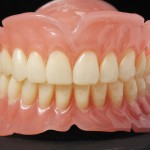
Internationally the rates of edentulousness are estimated to be between 7% and 69%.
In 2009 the American College of Prosthodontists (ACP) formed a task force to establish evidence-based guidelines for the care and maintenance of complete dentures. This comprised members of the ACP, the Academy of General Dentistry, American Dental Association (ADA) Council on Scientific Affairs, the American Dental Hygienists’ Association, the National Association of Dental Laboratories, and representatives from GlaxoSmithKline Consumer Healthcare.
PubMed, Embase, known prosthodontic references and materials obtained from the U.S. Centers for Disease Control and Prevention, Atlanta were searched. 120 manuscripts were summarised for a meeting of all the task force members to develop the guidelines. After the meeting and multiple conference calls, the document was developed and agreed upon by the task force members.
The guidelines agreed were:-
1. Careful daily removal of the bacterial biofilm present in the oral cavity and on complete dentures is of paramount importance to minimize denture stomatitis and to help contribute to good oral and general health.
2. To reduce levels of biofilm and potentially harmful bacteria and fungi, patients who wear dentures should do the following:
(a) Dentures should be cleaned daily by soaking and brushing with an effective, nonabrasive denture cleanser.
(b) Denture cleansers should ONLY be used to clean dentures outside of the mouth.
(c) Dentures should always be thoroughly rinsed after soaking and brushing with denture-cleansing solutions prior to reinsertion into the oral cavity. Always follow the product usage instructions.
3. Although the evidence is weak, dentures should be cleaned annually by a dentist or dental professional using ultrasonic cleansers to minimize biofilm accumulation over time.
4. Dentures should never be placed in boiling water.
5. Dentures should not be soaked in sodium hypochlorite bleach, or in products containing sodium hypochlorite, for periods that exceed 10 minutes. Placement of dentures in sodium hypochlorite solutions for periods longer than 10 minutes may damage dentures.
6. Dentures should be stored immersed in water after cleaning, when not replaced in the oral cavity, to avoid warping.
7. Denture adhesives, when properly used, can improve the retention and stability of dentures and help seal out the accumulation of food particles beneath the dentures, even in well-fitting dentures.
8. In a quality-of-life study patient ratings showed that denture adhesives may improve the denture wearer’s perceptions in retention, stability, and quality of life; however, there is insufficient evidence that adhesives improve masticatory function.
9. Evidence regarding the effects of denture adhesives on the oral tissues when used for periods longer than 6 months is lacking. Thus, extended use of denture adhesives should not be considered without periodic assessment of denture quality and health of the supporting tissues by a dentist, prosthodontist, or dental professional.
10. Improper use of zinc-containing denture adhesives may have adverse systemic effects. Therefore, as a precautionary measure, zinc-containing denture adhesives should be avoided.
11. Denture adhesive should only be used in sufficient quantities (three or four pea-sized dollops) on each denture to provide sufficient added retention and stability to the prostheses.
12. Denture adhesives should be completely removed from the prosthesis and the oral cavity on a daily basis.
13. If increasing amounts of adhesives are required to achieve the same level of denture retention, the patient should see a dentist or dental professional to evaluate the fit and stability of the dentures.
14. While existing studies provide conflicting results, it is not recommended that dentures should be worn continuously (24 hours per day) in an effort to reduce or minimize denture stomatitis.
15. Patients who wear dentures should be checked annually by the dentist, prosthodontist, or dental professional for maintenance of optimum denture fit and function, for evaluation for oral lesions and bone loss, and for assessment of oral health status.
The guidelines were published in both the Journal of the American Dental Association and the Journal of prosthodontics.
Felton D, Cooper L, Duqum I, Minsley G, Guckes A, Haug S, Meredith P, Solie C, Avery D, Deal Chandler N; American College of Prosthodontists. Evidence-based guidelines for the care and maintenance of complete dentures: a publication of the American College of Prosthodontists. J Prosthodont. 2011 Feb;20 Suppl 1:S1-S12. doi: 10.1111/j.1532-849X.2010.00683.x. PubMed PMID: 21324026.
Felton D, Cooper L, Duqum I, Minsley G, Guckes A, Haug S, Meredith P, Solie C, Avery D, Chandler ND; American College of Prosthodontists; Academy of General Dentistry; American Dental Association Council on Scientific Affairs; AmericanDental Hygienists’ Association; National Association of Dental Laboratories;GlaxoSmithKline Consumer Healthcare. Evidence-based guidelines for the care and maintenance of complete dentures: a publication of the American College of Prosthodontists. J Am Dent Assoc. 2011 Feb;142 Suppl 1:1S-20S. Review. PubMedPMID: 21282672.
